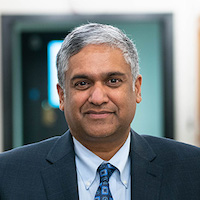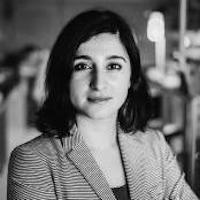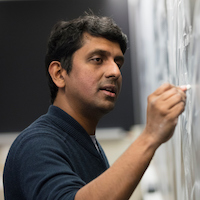Speakers
Anantha P. Chandrakasan (host)
Anantha P. Chandrakasan is dean of the MIT School of Engineering and the Vannevar Bush Professor of Electrical Engineering and Computer Science. He serves as co-chair of the MIT–IBM Watson AI Lab, the chair of the MIT–SenseTime Alliance on Artificial Intelligence, the chair of the Abdul Latif Jameel Clinic for Machine Learning in Health (J-Clinic), and a board member of The Engine. Chandrakasan also leads the MIT Energy-Efficient Circuits and Systems Group. He is a recipient of awards including the 2009 Semiconductor Industry Association (SIA) University Researcher Award, the 2013 IEEE Donald O. Pederson Award in Solid-State Circuits, and an honorary doctorate from KU Leuven in 2016. A fellow of IEEE, he was elected to the National Academy of Engineering in 2015. Chandrakasan earned a BS, an MS, and a PhD in electrical engineering and computer sciences from the University of California at Berkeley.
Daniel G. Anderson
Daniel G. Anderson is a leading researcher in the field of nanotherapeutics and biomaterials. He is appointed in the Department of Chemical Engineering, the Institute for Medical Engineering and Science, the Koch Institute for Integrative Cancer Research, and the Harvard-MIT Division of Health Science and Technology at MIT. The research done in Professor Anderson’s laboratory is focused on developing new materials for medicine. He has pioneered the development of smart biomaterials, and his work has led to advances in a range of areas, including medical devices, cell therapy, drug delivery, gene therapy and material science.
Professor Anderson received a B.A. in mathematics and biology from the University of California at Santa Cruz and a Ph.D. in molecular genetics from the University of California at Davis. His work has resulted in the publication of over 400 papers, patents and patent applications. These advances have led products that have been commercialized or are in clinical development, as well as to the foundation of companies in the pharmaceutical, biotechnology, and consumer products space including CRISPR Tx (Nasdaq:CRSP), Living Proof, Sigilon, Verseau Tx, and Olivo Labs.
Lydia Bourouiba
Lydia Bourouiba is an Associate Professor at the Massachusetts Institute of Technology, where she directs the Fluid Dynamics of Disease Transmission Laboratory. Her research leverages advanced fluid dynamics experiments at various scales, biophysics, and applied mathematics to elucidate interfacial flow and fluid fragmentation processes driving mixing, transport, and persistence of particles and microorganisms relevant to disease transmission in human, animal, and plant populations. Prof. Bourouiba founded the Fluids and Health Conference, creating an international forum for exchange on frontier research and challenges in health, where fluid dynamic concepts are at the core, including infectious diseases, drug delivery, food safety, and related policy. Prof. Bourouiba is the recipient of many awards, including the Tse Cheuk Ng Tai’s Prize for Innovative Research in Health Sciences, the Ole Madsen Mentoring Award, and the Smith Family Foundation Odyssey Award for high-risk/high-reward basic science research.
Jeffrey C. Grossman
Jeffrey C. Grossman is the Department Head of Materials Science and Engineering at the Massachusetts Institute of Technology and the Morton and Claire Goulder and Family Professor in Environmental Systems. He received his PhD in theoretical physics from the University of Illinois and performed postdoctoral work at the University of California at Berkeley. He was a Lawrence Fellow at the Lawrence Livermore National Laboratory and returned to Berkeley as director of a Nanoscience Center and head of the Computational Nanoscience research group, with a focus on energy applications. In fall 2009, he joined MIT, where he has developed a research program known for its contributions to energy conversion, energy storage, membranes, and clean-water technologies. In recognition of his contributions to engineering education, Grossman was named an MIT MacVicar Faculty Fellow and received the Bose Award for Excellence in Teaching, in addition to being named a fellow of the American Physical Society. He has published more than 200 scientific papers, holds 17 current or pending U.S. patents, and recently co-founded a company to commercialize graphene-oxide membranes.
Vivienne Sze SM ’06, PhD ’10
Vivienne Sze is an associate professor of electrical engineering and computer science at MIT. She is also the director of the Energy-Efficient Multimedia Systems research group at the Research Lab of Electronics (RLE). Sze works on computing systems that enable energy-efficient machine learning, computer vision, and video compression/processing for a wide range of applications, including autonomous navigation, digital health, and the internet of things. She is widely recognized for her leading work in these areas and has received many awards, including the AFOSR and DARPA Young Faculty Award, the Edgerton Faculty Award, several faculty awards from Google, Facebook, and Qualcomm, the 2018 Symposium on VLSI Circuits Best Student Paper Award, the 2017 CICC Outstanding Invited Paper Award, and the 2016 IEEE Micro Top Picks Award. As a member of the JCT-VC team, she received the Primetime Engineering Emmy Award for the development of the HEVC video compression standard.
Vinod Vaikuntanathan
Vinod Vaikuntanathan is an associate professor of computer science at MIT and the chief cryptographer at Duality Technologies. Vinod is the co-inventor of most modern fully homomorphic encryption systems and many other lattice-based (post-quantum secure) cryptographic primitives. His work has been recognized with a George M. Sprowls PhD thesis award (2009), an IBM Josef Raviv Fellowship (2008), a Sloan Faculty Fellowship (2013), a Microsoft Faculty Fellowship (2014), an NSF CAREER Award (2014), a DARPA Young Faculty Award (2018), and a Harold E. Edgerton Faculty Award (2018). He holds SM and PhD degrees from MIT and a BTech degree from the Indian Institute of Technology Madras.






